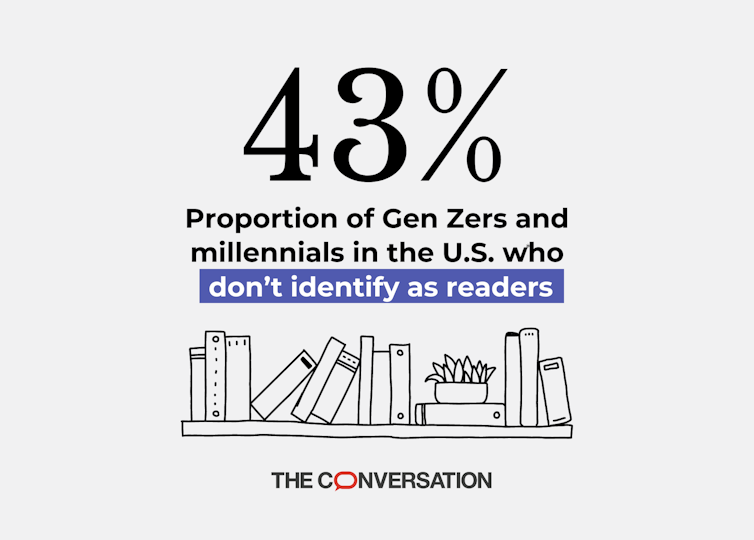
The Dialog, CC BY
Determining with an train is completely completely different from actually doing it.
For example, 49% of Folks play video video video games, nonetheless solely 10% set up as gamers.
In step with a contemporary survey we carried outthere’s moreover a small gap between learning train and id for youthful readers: 61% of Know-how Z and millennials have study a print e e-book, e-book or audiobook to date 12 months, nonetheless solely 57% set up as readers.
And however there was a puzzling aspect of our outcomes: The 43% of Gen Z and millennials who didn’t set up as readers actually talked about they study further print books per thirty days than Gen Z and millennials common.
In numerous phrases, youthful people who don’t set up as readers are learning books on the subsequent value than their generational cohorts as a whole.
Why?
Our best guess is that “reader” is an id, not a habits. And that id is buttressed by involvement in e e-book golf tools, engagement with social media communities resembling Booktok and Bookstagram, and entry to libraries and bookstores.
Setting up bookish communities
Identities of reader, creator and fan seem to bolster each other.
Millennials and members of Gen Z who set up as readers are moreover further extra prone to be writers and participate in fandom.
Group is significant to all of these identities. For example, two of the very best causes millennials and members of Gen Z set up as followers are the reality that they’re “part of a fan group” and are ready to “meet others like me.”
Every August, the Edinburgh Information Worldwide Information Competitors in Scotland – an important e e-book competitors on the earth – locations on a whole month of events spherical books, authors and readers.
In the middle of the 2023 eventwhich we attended, you’d see attendees clamoring to see writers like Alice Oseman, author of the bestselling “Heartstopper” graphic novels.
We heard followers prepared in that line talking about how Oseman’s sequence featured the first queer characters they’d encountered in a e e-book. Readers acquired right here to the competitors with household and pals, and made new associates and connections on the event. The keenness was palpable.
What ‘counts’ as learning
Nevertheless does a graphic novel like “Heartstopper” even rely as “precise” learning?
If the Nationwide Endowment for the Arts definitions from the early 2000s are to be believed, then no – till it’s learning literature for leisure, it shouldn’t be “precise” learning.
And some millennials and members of Gen Z may think that the learning they’re doing isn’t precise learning. Nevertheless a slim definition of what counts as learning ignores the love Gen Zers and millennials have for content material materials resembling graphic novels, manga and comics.
In our analysis, 59% talked about they want a graphic mannequin of a story over text-only. And let’s not overlook audiobooks, which 34% of Gen Zers and millennials want over text-only. Millennials and members of Gen Z are moreover learning nonfiction or learning for varsity and work, reasonably than pleasure.
In a separate analysis from 2020we found that 83% of American readers study books for causes aside from leisure, resembling school, work or self-improvement.
What makes a reader?
Additional Gen Z and millennial ladies set up as readers, so there is likely to be gender variations at play: Possibly youthful males, no matter how rather a lot they study, are hesitant to rigorously set up with an train they see as a result of the purview of women.
Socioeconomic standing could situation into whether or not or not anyone feels they’ll declare a readerly id. Gen Zers and millennials who didn’t set up as readers had been a lot much less extra prone to have a job to date 12 months and earned a lot much less money.
So plainly determining as a reader is normally about group, wealth and gender – and what counts as learning – than it is about how rather a lot anyone actually reads.
Possibly there could also be an effort to broaden the definition of “learning” – certain, audiobooks and comics rely – and to assemble bookish communities previous areas resembling Bookstagram and BookTok. And being a reader could also be better than loving conventional literature, though certain social media developments, resembling “Finding out Like Rory” – a BookTok phenomenon centered on the literary classics study by Rory Gilmore of “Gilmore Girls” – amounted to easily that.
If youthful people had been to see being a reader as merely having enjoyable with and interesting with tales, what variety of of them would start to call themselves readers in any case?
